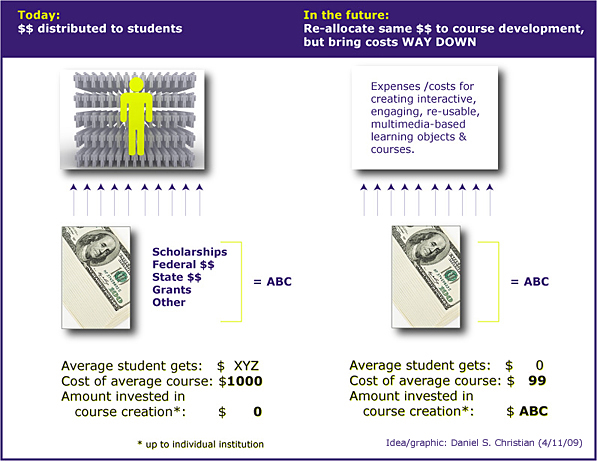How Washington could make college tuition free (without spending a penny more on education) — from theatlantic.com by Jordan Weissmann
From DSC:
This article reminds me of this graphic I created a few years ago…
From DSC:
Back in April 2009, I added these comments to that graphic:
For students: Bring costs waaaayyyyy down and access waaayyy up!
Plus, no more defaulted loans, students could experience richer content, students wouldn’t have to wait as much on financial aid decisions. There would be fewer financial aid headaches; and the resources devoted to figuring out & processing financial aid could be reduced. The issue will be how an institution can differentiate itself in such a new world…but that issue will have to be dealt with in the future anyway.
“It is a ridiculous irony that FAFSA is too intimidating a process for many of the very people it is designed to assist. Margaret Spellings, secretary of education in the Bush administration, estimated that 8 million American families never applied for aid for which they were eligible because they were scared off by the FAFSA process.”










I’m afraid the argument Mr. Weissman is making is ignoring reality. What he is saying is if you take the amount of money given in student loans to private collages and give it to public schools instead, you could then make it “free”. So here’s a couple of thoughts. 1. Many private schools serve niche markets. My college for example teaches things like film, recording arts, game design and other entertainment skills. These are all highly marketable skills in our current society. Our grads get jobs doing this, probably much more often than a sociology major (I’m not picking on them, it was just first thing to come to mind). 2. What happens when you make something free? You get a lot of demand. I remember a few years ago Chick-fil-a made their chicken sandwiches 60 cents for one day which was their original price. The line was out the door the whole day. If college tuition is “free” how many more people will attend? How much longer will they stay in school if it’s paid for? 3. Does the current public university system have the capacity to deal with this massive increase in students? And this is the important point, they can’t spend more than what is being spent now or else the whole argument collapses. 4. Since when does having less competition cause prices to fall?
I’m not buying it. 🙂
As always Andrew, some solid, well-thought out, insightful commentary — thanks!
Daniel